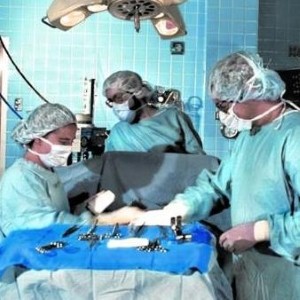The usual operation to reduce male hormone levels is called a subcapsular orchiectomy and involves making a cut into each of the testicles and removing the active tissue from the inside so that they no longer produce testosterone. Occasionally removal of the whole testicle might be recommended. The injections are of a type of drug called luteinising hormone releasing-hormone (LHRH) analogue – for example, goserelin (Zoladex), leuprorelin (Prostap SR) or triptorelin (De-capeptyl sr). These injections stop the testicles producing testosterone and the effects are very similar to the operation. Goserelin and leuprorelin are now available as an injection that needs to be given only once every three months. Other three-monthly injections are being developed. A drug of a similar type called buserelin (Suprecur) is taken as a form of snuff into the nose, although this is not used much for treating cancer of the prostate.
Whether the treatment is an operation or a monthly injection, the level of male hormone is reduced and most men find that, as a result, their sexual activity – both their desire for sex and their ability to have an erection – is lost. Occasionally this does not happen, for reasons that are not understood; this should be thought of as a bonus and does not mean that treatment will not be effective.
 Hot flushes, very similar to the condition experienced by women after the menopause, are another problem. These consist of feeling hot, or of attacks of sweating. Although fairly common, most men are only mildly affected and the condition tends to improve. If hot flushes are more severe, treatment is available. It is important to realise that they are a side-effect of the treatment – some men worry that hot flushes might be a sign that the cancer is advancing.
Hot flushes, very similar to the condition experienced by women after the menopause, are another problem. These consist of feeling hot, or of attacks of sweating. Although fairly common, most men are only mildly affected and the condition tends to improve. If hot flushes are more severe, treatment is available. It is important to realise that they are a side-effect of the treatment – some men worry that hot flushes might be a sign that the cancer is advancing.
The effect of the operation on the testicles is to reduce their size, but the injection treatment also causes shrinkage. The testicles are associated with masculinity and it is natural to feel that this type of treatment involves ‘castration’. However, most men with advanced prostatic cancer feel so much better as the treatment starts to work that this does not usually worry them too much.
Pros and Cons of Both Treatments
Although the operation and the injections have very similar effects in the long run, there are differences between them at the time the treatment is started. Orchiectomy is only a fairly minor operation, but it does mean going into hospital, usually requires a general anaesthetic and is painful for several days. Minor complications such as bruising or swelling, or wound infection are not unusual. The operation works straight away and sometimes the symptoms are better as soon as the patient wakes up from the anaesthetic. The injections work more slowly and in fact during the first few weeks of treatment they actually cause an increase in the amount of testosterone. This could make the cancer grow a little and often for this reason tablets of another type of hormone treatment are also given for a few weeks, starting several days before the first injection.
